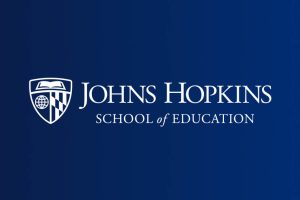The Post-Master’s Certificate in Applied Behavior Analysis (ABA) is an intensive graduate program designed for educational professionals to complete coursework and training in the field of ABA. Educators receiving preparation in the evidence-based practice of ABA will be better prepared to meet the needs of a growing population of students requiring special education and behavioral support.
Johns Hopkins is one of the only Maryland universities offering the ABA certificate, a valuable career credential for teachers, educators, or administrators. The pass rate for first-time Johns Hopkins School of Education graduates on the Board Certified Behavior Analyst® (BCBA) Examination greatly exceeds the national rate
Questions? Please reach out and we’ll be in touch soon.
Upcoming Admissions Events
Have questions about our degree programs, the application, or financial aid and costs? Join us for an inside look at a graduate experience defined by innovation and driven by evidence-based research. Learn more about your area of interest or career path, meet some of our faculty, and connect to the Johns Hopkins School of Education community. Check out our admissions events and register for a virtual information session today.

No Events at this time.

No Events at this time.
Core Faculty
-
Tamara Marder, PhD, BCBA-D
Associate Professor
Program Director, Special Education and Applied Behavior Analysis ProgramsAffiliation
Innovative Teaching & Leadership
Expertise
Special Education

Tamara Marder, PhD, BCBA-D
Associate Professor
Program Director, Special Education and Applied Behavior Analysis Programs
Affiliation
Innovative Teaching & Leadership
Expertise
Special Education

Program Overview
Candidates in the Post-Master’s Certificate in Applied Behavior Analysis program receive preparation in the evidence-based practice of ABA to meet the needs of a growing population of students with academic and behavioral needs. The program focuses on applying the science and methodology of ABA to educational settings. Candidates learn how to develop, deliver, and evaluate effective teaching practices as well as to identify specific strategies and resources teachers can use to better serve students.
The program provides the option to enroll in four elective practicum courses that are designed to meet fieldwork requirements outlined by the Behavior Analyst Certification Board (BACB). The practicum provides supervised real-world experiences in the application of behavior-analytic services in educational settings and includes both individual and group supervision.
The Johns Hopkins School of Education is one of the only Maryland universities offering the ABA certificate, and it is a valuable career credential for teachers, educators, or administrators. The pass rate for first-time Johns Hopkins School of Education graduates on the Board Certified Behavior Analyst® (BCBA) Examination greatly exceeds the national rate.
The curriculum and instructional delivery consist of:
- ABA coursework (seven courses) offered in a synchronous online format.*
- Optional: Choice of one to four elective practicum courses designed to meet BCBA fieldwork requirements. The practicum provides supervised real-world experiences in the application of behavior-analytic services in educational settings and includes both individual and group supervision. The option to enroll in practicum is limited to candidates in the Baltimore–Washington, D.C. area.
*The Association for Behavior Analysis International has verified the following courses toward the coursework requirements for eligibility to take the BCBA examination. Applicants will need to meet additional requirements before they can be deemed eligible to take the examination.
Financial Support: Project EnRICH
For students enrolled in the Post-Master’s Certificate in Applied Behavior Analysis (ABA) program, Project EnRICH prepares multilingual scholars to serve children from diverse cultural backgrounds who have disabilities or high-intensity needs.
“This is a great need within the field of ABA, and we are looking forward to the opportunity to further advance our ABA graduate program so that we may continue in our goal of providing high-quality training to future, school-based BCBAs.

“This is a great need within the field of ABA, and we are looking forward to the opportunity to further advance our ABA graduate program so that we may continue in our goal of providing high-quality training to future, school-based BCBAs.

Legal Disclosure
Legal Disclosure
State Authorization Disclosure Regarding Educational Prerequisites
Federal regulations require Johns Hopkins to disclose to students considering enrollment or enrolled in this program whether or not it meets educational prerequisites for licensure or certification by state. Educational Prerequisites for Professional Licensure or Certification.
Educational Prerequisites for Professional Licensure or Certification
Prerequisite: Candidates for admission must possess an earned graduate degree (e.g., master’s degree or doctorate) from a regionally accredited college or university. Please see the Behavior Analyst Certification Board (BACB) website for more information.
Students interested in applying for Board Certified Behavior Analyst® (BCBA®) Certification following the successful completion of this degree program are strongly encouraged to visit the following professional associations for information on state requirements.
BACB – Behavior Analyst Certification Board
Licensure Requirements for Behavior Analysts by State
(1) This program satisfies the educational prerequisites for licensure or certification in the following states: Maryland. Maryland has a licensure agreement that provides for reciprocity with Alaska, Arizona, Arkansas, California, the District of Columbia, Florida, Hawaii, Louisiana, Maine, Michigan, Minnesota, Mississippi, Missouri, New Hampshire, New Jersey, New Mexico, North Dakota, Oklahoma, Rhode Island, South Carolina, Tennessee, West Virginia, and Vermont.
(2) This program does not satisfy the educational prerequisites for licensure or certification in the following states: The licensure agreement provides for reciprocity with conditions in the following states: Colorado, Delaware, Idaho, Indiana, Nevada, North Carolina, Wyoming, Wisconsin, Virginia, Alabama, Connecticut, Georgia, Illinois, Iowa, Kansas, Kentucky, Massachusetts, Montana, Nebraska, New York, Ohio, Oregon, Pennsylvania, South Dakota, Texas, Utah, and Washington.
Students located in a state where their program does not meet that state’s licensure or certification educational prerequisites may have difficulty finding a job in that occupation and/or repaying loans borrowed to complete the program.
